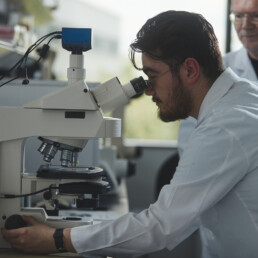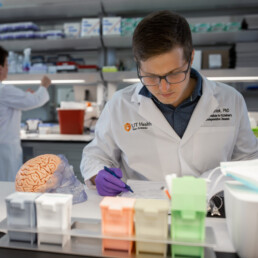Clinical Therapies
Home to one of the region’s largest cancer centers, UT Health San Antonio and the Mays Cancer Center place an emphasis on investigating the many factors involved in researching and treating brain cancer. Along with these studies focused on adult brain cancer, the Greehey Children’s Cancer Research Institute is one of the nation’s only facilities focused solely on children’s cancer studies

How we are advancing clinical therapies





Brain Cancer Statistics
Face the Facts
Brain cancer is rare, with less than 1% of people in the U.S. expected to be diagnosed in 2022
As a result of improved therapy and diagnosis, nearly 75% of all children diagnosed today will be “cured” of their cancer
Cancer patients between the ages of 15 and 39 face a unique set of challenges that might benefit from clinical trials
Brain Cancer
The Mays Cancer Center at UT Health San Antonio is one of only four NCI-designated cancer centers in Texas and the only one in South Texas. NCI designation places us among the world’s respected cancer centers. It also brings innovative new therapies to people in San Antonio and the 38 counties of South Texas we serve.

Another leader in the brain cancer research is Andrew Brenner, MD, PhD, a medical oncologist and associate professor in the Division of Hematology and Medical Oncology at the Long School of Medicine, who studies breast cancer, including breast cancer that has spread to the brain. Brenner’s scientific studies have been evaluating how to piggyback potent drugs onto specially designed molecules that are capable of entering the brain.
M.D., Hematology - Mays Cancer Center
Glioblastoma Research
Glioblastoma is an aggressive type of cancer that can occur in the brain or spinal cord and while the disease can occur at any age, it tends to occur more often in older adults. Glioblastoma is the most common malignant brain tumor and is one of the most complex, deadly, and treatment-resistant cancers: a tumor with tentacles that spread throughout the brain. Doctors and scientists at UT Health San Antonio lead significant studies in understanding glioblastomas and research the impact of how the disease can be treated in the future.
Radiation biologist and professor in the Long School of Medicine Department of Neurosurgery at UT Health Science Center in San Antonio, Sandeep Burma, PhD, evaluates the treatment and the scientific implications of therapeutic outcomes of this lethal brain tumor.
The translational research focus of Sandeep Burma, PhD, laboratory is on glioblastoma (GBM), brain tumors that are highly therapy resistant. These tumors are treated with high doses of radiation which increases survival but, unfortunately, the irradiated tumor usually recurs after a short period of time. Dr. Burma’s lab is understanding the basis of therapy resistance and recurrence in GBM. The lab finds that some of the cancer-promoting pathways driving tumor development also promote efficient DNA repair in these tumors making them resistant to radiation therapy. They also find that aging-like changes caused by radiation to the tumor and its microenvironment drives recurrence as these prematurely aged (senescent) cells secrete tumor promoting factors. Their research opens up the possibility of improving GBM therapy by targeting DNA repair proteins in tumor cells or eliminating senescent cells in the tumor by using a novel class of drugs called senolytics. Moreover, as exposure to radiation is a risk factor for GBM development,
Dr. Burma’s lab is also investigating how radiation can drive brain tumor development using mouse models of radiation-induced glioma.
Professor of Neurosurgery, Biochemistry and Structural Biology, Vice Chair (Research)
Neurosurgical Oncology
UT Health San Antonio’s board-certified neurosurgical oncologists are conducting groundbreaking clinical trials that show promise of curing brain tumors. Our world-renowned team of surgeons provide an unprecedented level of care to cancer patients and their families.
Cerebrovascular Neurosurgery
UT Health San Antonio’s Neurosurgery Cerebrovascular Center provides the highest standard of care for patients with disorders involving blood vessels of the brain and spine revolutionizing the lives of the region’s stroke and aneurysm patients.
UT Health San Antonio’s Department of Neurosurgery is led by John Floyd, MD, Chair of the Department of Neurosurgery, Associate Professor of Neurosurgery and Otolaryngology and the Carl Raba Family Chair in Neuro-Oncology.
Chair of the Department of Neurosurgery
Associate Professor of Neurosurgery and Otolaryngology
Childhood Brain Tumors
We also are home to the Greehey Children’s Cancer Research Institute, only one of two institutes in the United States dedicated solely to pediatric cancer research. Its 19 laboratories leverage strengths in cancer genomics, DNA repair, RNA biology and drug development to find new and less toxic treatments for childhood cancers.

Astrocytoma Research
Astrocytomas are another group of brain tumors that affect children. The 5-year progression-free survival rate for these patients is ~ 68%. However, significant morbidity is associated with the presence of residual tumor and the current therapy that includes neuroendocrine-cognitive deficits, visual deficits, vasculopathy and secondary tumors. Unfortunately, metastatic potential and transformation to a high-grade astrocytoma further contributes to the poor prognosis.
Research in Dr. Peter Houghton’s laboratory have led to the discovery of novel approaches to circumvent the mechanisms of acquired drug resistance in astrocytoma patients. Using patient-derived pre-clinical tumor models, Dr. Houghton’s team has shown that combination therapy targeting two different signaling pathways (BRAF and STAT3) is not only effective in treating astrocytoma’s that are no more responsive to current therapy; but it may also prevent the onset of resistance.
Deputy Director of GCCRI
Ph.D., Department of Molecular Medicine
The University of Texas Health Science Center at San Antonio (UT Health San Antonio), a primary driver for San Antonio's $44.1 billion health care and biosciences sector, is the largest academic research instituion in South Texas with an annual research portfolio of more than $360 million. Driving substantial economic impact with its six professional schools, a diverse workforce of 7,900, an annual operating budget of $1.08 billion and clinical practices that provide 2.6 million patient visits each year, UT Health San Antonio plans to add more than 1,500 higher-wage jobs over the next five years to serve San Antonio, Bexar County and South Texas.